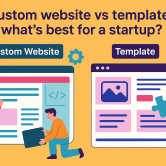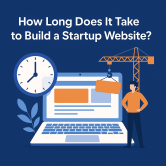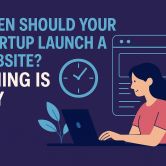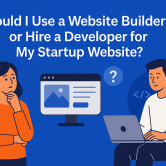Should I Use a Website Builder or Hire a Developer for My Startup Website?
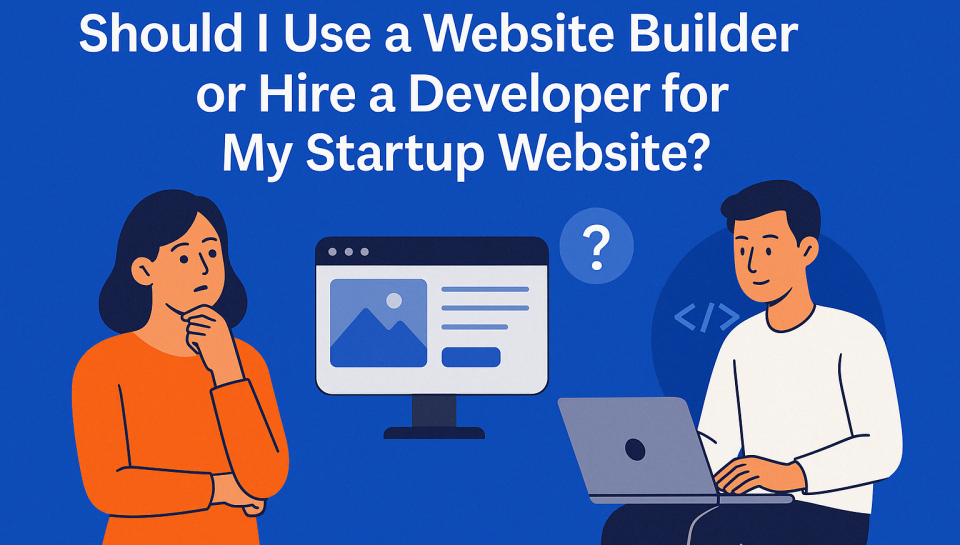
Should I Use a Website Builder or Hire a Developer for My Startup Website?
Introduction
Launching a startup is exciting, but it comes with crucial decisions that shape your growth. One of the first challenges every founder faces is this: How should I build my website? In a world where your website is often the first interaction with potential customers, making the right choice can make or break your success.
Should you use a website builder like Wix, Squarespace, or Shopify, or hire a developer or agency to craft a custom solution? This isn’t just about aesthetics. It’s about performance, branding, scalability, and long-term ROI.
In this blog, we’ll explore the pros and cons of both options, share real-world startup experiences, and help you decide the best route to take for your business stage and budget.
Problem: The Startup Dilemma
Startups often operate under tight budgets, fast timelines, and evolving product strategies. The website is more than just an online presence—it’s your digital storefront, lead magnet, pitch deck, and customer trust-builder rolled into one.
Here are common challenges startups face when deciding how to build their website:
Limited resources: You want something professional without burning all your funds.
Urgency to launch: Time is money. The longer you wait to go live, the more opportunities you miss.
Non-technical founders: You don’t know how to code and want a simple solution.
Scalability concerns: Your startup might outgrow the initial platform within months.
SEO and performance: You want to rank on Google and provide a great user experience.
Solution: Website Builder vs. Hiring a Developer
Let’s break down the detailed pros and cons of each option.
🔧 Website Builders
Website builders are platforms like Wix, Squarespace, Shopify, and Webflow. They provide templates, drag-and-drop interfaces, and built-in features like hosting, SEO, and analytics. They are popular among solo founders and small teams.
Pros
Cost-Effective: Website builders usually offer affordable monthly plans ranging from $10 to $50. This is ideal for early-stage startups looking to keep costs down.
Quick to Launch: With pre-designed templates and intuitive editors, you can go live within a day. No waiting on developers or back-and-forths.
Ease of Use: Even non-technical users can design, edit, and manage content. You don’t need to know a single line of code.
All-in-One Management: Builders offer hosting, SSL certificates, security, and even basic SEO tools. You don’t have to manage third-party services.
Good for MVPs: Ideal for launching a minimum viable product quickly, collecting feedback, and validating ideas before investing more.
Cons
Limited Flexibility: You’re confined to the features and templates offered. Want a complex booking system or custom logic? Tough luck.
Performance Trade-offs: Website builders often inject bloated code, which slows down load times and hurts SEO rankings.
Generic Branding: With templates being widely used, your website may look similar to many others, reducing brand uniqueness.
Poor Scalability: As your business grows, migrating to a more robust system or adding advanced features becomes hard or impossible.
Hidden Costs: You may need to pay for extra features, add-ons, plugins, or usage limits as your site scales.
👨💻 Hiring a Developer or Agency
Hiring a freelance developer or an agency means getting a website custom-built to your business needs using technologies like WordPress (custom), React, Laravel, or Webflow (Dev mode).
Pros
Complete Customization: Every feature, animation, layout, and user flow is designed specifically for your brand. You can integrate APIs, CRMs, payment systems, and more.
High Performance: A well-coded website loads faster, ranks better on Google, and provides smoother user experiences.
Professional Aesthetic: Custom UI/UX design ensures your brand is visually distinct and strategically aligned with your customer journey.
Scalability & Security: Developers can build with scalability in mind, ensuring your platform can handle more traffic, data, and functionalities as you grow.
Future-Proofing: Custom-built websites are easier to adapt and upgrade as your startup pivots, adds products, or enters new markets.
Cons
Higher Initial Cost: Custom development usually starts from $1,000 and can go up to $10,000 or more depending on features.
Longer Time to Launch: Custom websites can take 3 to 8 weeks to build. This includes time for revisions, testing, and deployment.
Requires Project Management: You need to actively communicate your vision, review designs, test features, and possibly manage a dev team or freelancer.
Ongoing Maintenance: After launch, you’ll need a developer for updates, bug fixes, and new features unless you build an in-house team.
Risk of Developer Dependency: If you rely on one developer and lose access to them, maintaining the site could become challenging.
Real-World Startup Case Studies
Case 1: Builder Regrets
A food delivery startup used Wix for their MVP. It worked great initially, but as they gained traction, they needed:
User dashboards
Custom location-based pricing
Integration with Zoho CRM
They had to rebuild everything on a custom stack later, which cost $3,000 and 2 months of downtime. Their SEO also took a hit.
Case 2: Developer Success
A productivity SaaS hired a freelance developer to build their landing page and blog using Webflow + custom animations. Their results:
60% lower bounce rate than competitors
4x lead conversions after split testing
Top 3 rankings for 8 core keywords within 6 months
Cost: $3,500. ROI? They raised $250k in seed funding within the year.
Comparison Table
| Feature | Website Builder | Hire a Developer |
|---|---|---|
| Cost | Low ($10–$50/month) | High ($1,000–$10,000+) |
| Time to Launch | 1–2 days | 3–8 weeks |
| Technical Skills Needed | None | Moderate to High |
| Custom Features | Limited | Fully Custom |
| SEO Optimization | Basic | Advanced |
| Mobile Optimization | Template-Based | Pixel Perfect |
| Performance | Often Slower | Fast & Optimized |
| Scalability | Difficult | Built to Scale |
| Brand Uniqueness | Low | High |
| Ownership | Platform Dependent | Full Control |
Benefits of Making the Right Choice
Save Money: Avoid rework and migration headaches later.
Better Performance: Enjoy faster load times and higher rankings.
Boost Conversions: Custom CTAs, copy, and flow designed to convert.
Build Trust: A premium look signals professionalism and builds authority.
Scale with Confidence: Add features, products, and automations as you grow.
When to Use a Website Builder
Validating a startup idea or MVP
Personal brand, landing page, or one-page promo
Extremely tight budget (<$500)
No tech experience and DIY mindset
No long-term scaling needs
When to Hire a Developer
You’re building a SaaS, marketplace, or platform
You care about SEO, conversions, and UX
You plan to scale quickly
You want advanced features and integrations
You’re aiming for Series A/B funding
Pro Tip: Combine Both
Start with a website builder but hire a developer to add custom sections or optimize performance. Example:
Use WordPress + Elementor
Hire a dev to build a custom header, schema markup, or API integration
Upgrade to custom code when your revenue justifies it
Your startup’s website isn’t just another task—it’s the foundation of your digital growth. Choosing between a builder or developer can set the tone for your marketing, lead gen, SEO, and conversion strategy.
At Qubixis.com, we help startups choose the smartest path. Whether it’s a lightning-fast MVP site or a full-scale custom web platform, we design with growth in mind.




